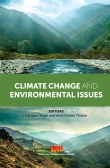Responding to Climate Change in South Asia: Lessons from India
- Author(s): Divya Sharma, Raina Singh and Aditya Raghwa
- Size: 140 mm × 220 mm
- Pages: 40
- ISBN: 9789394657830
Book Details
Responding to Climate Change in South Asia: lessons from India explores the strategic evolution of environmental response mechanisms across South Asia, emphasizing India's multifaceted approach to addressing ecological stress. It delves into the dynamic interplay between institutional frameworks, decentralized governance, and stakeholder-led initiatives, showcasing India's progression from centralized planning to ground-level execution. Drawing from examples such as state climate road maps, green budgeting practices, and community-led restoration, the study highlights how policy vision can translate into resilient development models.
Notable corporate and civil-society efforts - from technological innovation to inclusive natural resource governance - demonstrate the breadth of engagement necessary for impactful change. Comparative case studies from Bangladesh and Nepal add regional texture, underlining the value of grassroots-level empowerment and ecosystem stewardship. The discussion also covers international alliances and multilateral support mechanisms, noting how transboundary collaboration and financial innovation can enhance collective preparedness.
Despite the momentum, a few systemic gaps remain, including administrative silos, insufficient funding for adaptation, and the need for climate-conscious infrastructure. To bridge those gaps, we need a harmonized climate governance model that leverages South Asia's diverse institutional capacities, prioritizes justice, and embeds resilience across planning processes. India's experience provides a compelling framework for other emerging economies navigating similar developmental and environmental crossroads.
Target Audience
-
Policy Makers and Government Officials working in climate change, environment, and sustainable development.
Table of Contents
- Foreword
- Abbreviations
- Introduction
- Climate vulnerability in South Asia
- Decoupling policy and action
- Key climate actors and good practices from India
- Government initiatives: national and local leadership
- Corporate sector: driving innovation and investment
- Community-led action: grassroots resilience
- Comparative case studies
- Bangladesh
- Nepal
- India
- Indonesia
- Key barriers to climate action implementation
- Institutional fragmentation and coordination gaps
- Limited finance
- Limited technical and human capacity
- Public perception and behavioural challenges
- Deficits in urban planning and infrastructure
- Policy continuity and political will
- Role of international cooperation and climate finance
- Multilateral engagements and global leadership
- Technology transfer and capacity building
- India in regional context: strengths and opportunities
- Regional cooperation for shared challenges
- Conclusion
- Bibliography
Keywords
You may also like...
-
 Climate Change: Is it getting any better?
Climate Change: Is it getting any better?
-
 Climate Change and Environmental Issues
Regular Price 795.00
Special Price 715.00
Climate Change and Environmental Issues
Regular Price 795.00
Special Price 715.00
-
 Dealing with Climate Change: setting a global agenda for mitigation and adaptation
Regular Price 695.00
Special Price 625.00
Dealing with Climate Change: setting a global agenda for mitigation and adaptation
Regular Price 695.00
Special Price 625.00

